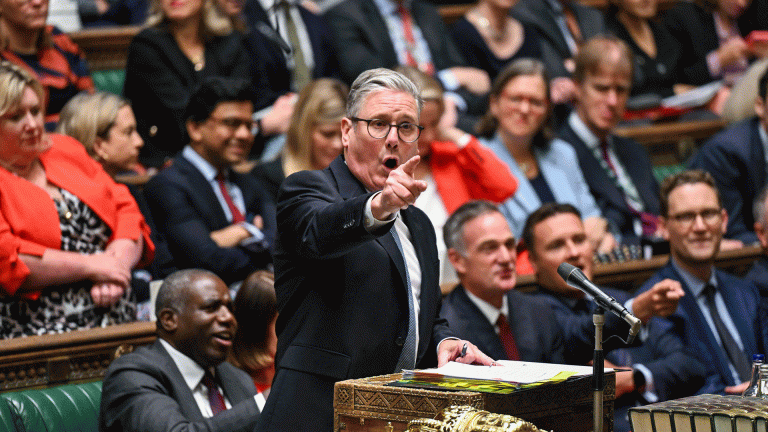This is an opportunity for the new government to set out its programme for the coming parliamentary session.
“No substantive parliamentary business can usually occur until after the speech is delivered,” the Institute for Government explains.
The next few days will still be busy, said Louise Thompson, a senior lecturer in politics at the University of Manchester. “In the immediate aftermath of the general election, Starmer will need to appoint his frontbench team,” she added.
“Labour have an influx of new MPs who will need to find their feet in the Commons, recruit staff, and Labour’s new cabinet ministers will need to get to grips with their new departments, find their feet and be briefed by civil servants.”
In addition to fielding calls from world leaders, Starmer will also meet many of them: he will attend a Nato summit in Washington 10-11 July.
Labour can’t introduce any legislation yet – but expect the publication of draft policy proposals in the form of green papers (essentially consultation documents) and white papers (more formal policy documents, sometimes draft legislation).
Advertising helps fund Big Issue’s mission to end poverty
The requirement to draft and pass new legislation means that promises for “immediate” change must be interpreted in a broad way, Thompson added.
“If we look back to the last time we had a new Labour government for example, Tony Blair was committed to some big policies (like devolution and a national minimum wage). But all of these big changes need legislation to pass through the Commons,” she said. “We can probably expect a raft of bills to be introduced and to slowly work their way through parliament over the next 6-12 months.”
There are loopholes to get things done quicker, but the new government is unlikely to seize them.
Take Section 21 (no-fault) evictions, for example, which the Labour manifesto pledges to “immediately abolish”.
There are a few ways the government could do this, explains Edward Kirton-Darling, senior lecturer in law at the University of Bristol.
“They could hypothetically try and push through a one-line bill before the summer which immediately abolishes Section 21, and then take steps to follow up on their other [housing] promises in later legislation,” he said.
Advertising helps fund Big Issue’s mission to end poverty
But it’s more likely that they will interpret their “immediately” commitment more loosely, instead taking it to mean “as quickly as is reasonably possible”.
“They will probably introduce a longer bill which follows through on the promises in the manifesto, as well as potentially some of the other sensible reforms in the Renters Reform Bill,” Kirton-Darling added.
Labour’s substantial majority means it will have little trouble passing the bills that it wants to pass – eventually. But this legislation still goes through an extensive scrutiny process, from a first reading to a debate to scrutiny in cross-party committees. Then it must pass to the other house of parliament for further debate and possible amendments.
Kirton-Darling expects the new Renters Reform Bill – complete with Section 21 ban – to pass some time this year.
“You can turn around an act of parliament in a matter of days. The counter terrorism and security act in 2001 and the 2020 coronavirus act – these are both examples of bills that passed extremely quickly,” he said.
“But it’s very unusual to do something that fast. Those were examples of perceived national emergencies. There is nothing in principle stopping a government from rushing something through. But conventionally, they wouldn’t do that.”
Advertising helps fund Big Issue’s mission to end poverty
Pretty much all of Labour’s manifesto commitments will require new primary legislation. But there are some exceptions to this, where the new government can enact changes within the scope of existing law.
Stopping flights to Rwanda is an example of this, explains Francis, which they could “in essence do on their first day in office”.
Existing legislation empowers the government to send asylum seekers to Rwanda, however, it doesn’t compel them to do so; nothing in existing law decrees that the government must send asylum seekers abroad. This means the new government can simply direct the Home Office to stop the flights, without passing a law.
“[It is the same for] the end of the de facto ban on new on-shore wind power (though clearly it will be years before voters see any new turbines appearing).”
Onshore wind is legal under UK legislation – but can be blocked by a single objection, meaning that projects are never, in practice, approved. Labour doesn’t need to pass legislation to change these obstructive planning permission conventions.
Indeed, the party could potentially use a loophole like this to get rid of Section 21 evictions without primary legislation, said Kirton-Darling, though they are unlikely to take this path.
Advertising helps fund Big Issue’s mission to end poverty
“I think it would be possible to direct the courts to stay all possession proceedings based on Section 21 for a specific period, giving them time to pass legislation abolishing Section 21 itself. Staying all such proceedings would not require primary legislation and so could be done much more quickly,” he said. “However, there would be a risk of challenge of such an approach in the courts, and there is a risk that it would not be deemed lawful, so the government might be reluctant to take this approach.”
The party will likely pursue some loopholes to make change without passing laws. But key changes will take time, concluded Francis.
“It may be several years before the impact of Labour’s key policies – Great British Energy; the gradual renationalisation of the railways; cutting NHS waiting lists; the recruitment of additional teachers and police officers; the national infrastructure strategy and reform of the planning system – is felt by voters,” he said.
“The other key date to watch out for will be Rachel Reeves’s first budget as chancellor, in (probably) September or October. That will give us a far clearer sense of Labour’s priorities – and how it intends to pay for them.”
Starmer’s Labour Party won the election on a platform of change – but it won’t happen overnight. Some things are already different, though: like the LinkedIn profiles of hundreds of newly unemployed Conservative MPs.
Do you have a story to tell or opinions to share about this? Get in touch and tell us more. Big Issue exists to give homeless and marginalised people the opportunity to earn an income. To support our work buy a copy of the magazine or get the app from the App Store or Google Play.
Advertising helps fund Big Issue’s mission to end poverty










